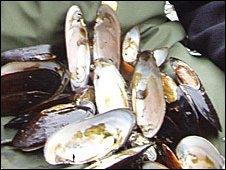Action to safeguard rare freshwater pearl mussels
- Published

Scotland's freshwater pearl mussels are protected by law
Wildlife crime officers have begun an operation to protect Scotland's freshwater pearl mussels.
A new survey suggests about 75% of the country's internationally-important pearl mussel sites have been damaged by criminals.
Criminal acts ranged from illegal pearl fishing to unauthorised river works which resulted in the destruction of entire pearl mussel populations.
Scottish Natural Heritage said the destruction was "shocking".
The mussels are protected under the Wildlife and Countryside Act 1981.
Wildlife crime officers and Scottish Natural Heritage (SNH) have launched Operation Caesar to safeguard the future of the species in Scotland.
Scotland has a total of 21 designated sites for pearl mussels, with Scottish rivers holding about half of the world's population of the species.
Anglers and walkers are being urged to help by reporting any sightings of suspicious activity near or on rivers.
Environment Minister Roseanna Cunningham said: "It is clear that the pearl mussel continues to suffer from indiscriminate and illegal ransacking by determined criminals.
"It is a UK wildlife crime priority and SNH has been tasked with co-ordinating action to try to halt this decline."
Iain Sime of SNH said: "An unexpected and unpleasant result of this monitoring has been the number of sites damaged by criminal activity, and the impacts from illegal pearl fishing.
"Our findings have been shocking, appalling even, and it is clear that we must undertake urgent work to save this species from almost certain extinction in some areas.
"Unauthorised engineering in one river seems to have destroyed the most significant pearl mussel bed of around 900 animals in the lower reaches of the river.
"Another site has seen the killing, in less than a day, of 50% of the mussels in the burn - making any recovery from the remaining animals extremely difficult."